Ports need to accelerate action in the race to a zero-emission ocean shipping future, environmental organizations Pacific Environment and Opportunity Green said in a new playbook released in connection with Climate Week NYC 2022. The IPCC’s 2022 climate report issued dire warnings to end our dependence on fossil fuels if we are to avoid the climate tipping point of 1.5 degrees Celsius of warming, and that includes shipping’s contribution to global emissions and port pollution. Now is the time to transition the shipping industry to clean energy technologies and a zero-emission future. By joining together and taking bold climate and public health actions, ports can play a leadership role in catalyzing the zero-emission ocean shipping transition this decade – and beyond, according to the two organizations.
The playbook launches with Pacific Environment’s new campaign: Ports for People. In partnership with Opportunity Green, Friends of the Earth, and WWF-Mexico, the organization is on a mission to end port and ship pollution. Together with local communities, allies, and partners, Ports for People seeks to transform ports from hotspots of fossil fuel pollution to thriving hubs of sustainable economic development and environmental protection. The playbook focuses on three main tracks: commitments, policy, and progress. These tracks lay out nine actions that will end port pollution, accelerate the market for zero-emissions technologies, reward first movers and ensure reliable access to zero-emissions infrastructure and fuels.
Meanwhile, more than 200 industry leaders have endorsed strategies from the Mission Possible Partnership (MPP) to decarbonize some of the world’s hardest-to-abate, carbon-intensive industries in this decade. New plans released at New York Climate Week for the production of near-zero emissions materials – aluminium, ammonia, and steel – have won support from more than 60 companies, bringing to more than 200 the tally of endorsements for MPP’s published Sector Transition Strategies (STS) which also include shipping, aviation, and trucking. The signatories reflect growing momentum among high-ambition companies, including steelmakers ArcelorMittal, Companhia Siderúrgica Nacional (CSN), Liberty Steel, SSAB, Rio Tinto, Tata Steel, thyssenkrupp and Vale; aluminum producers Alcoa, Rio Tinto, and EGA; and in the ammonia sector, CF Industries, BASF, SABIC, and Yara, as well as renewable energy providers Ørsted, Iberdrola and ACWA Power.
Alliances for Decarbonization
Rio Tinto joins First Movers Coalition to support the low-carbon transition: Anglo-Australian mining group Rio Tinto has decided to join the First Movers Coalition, a global initiative to help commercialize zero-carbon technologies by harnessing purchasing power and supply chains. Rio Tinto is making commitments to purchase more zero-emission fuel for its own shipping fleet and make greater use of suppliers who use zero-emission fuels in shipping and aviation. Specifically, the group expects at least 5% of its deep-sea shipping to be powered by zero-emission fuels by 2030, enabled by ships capable of using zero-emission fuels. What is more, at least 10% of the volume of Rio Tinto goods shipped internationally will be on ships using zero-emission fuels by 2030; on the way to 100% by 2040. More than 50 companies with a collective market value of about $8.5 trillion across five continents now make up the coalition to create early markets for innovative clean energy technologies. The initiative is led by the World Economic Forum and the US Government and targets sectors including shipping, aluminium, aviation, chemicals, concrete, steel, and trucking, which are responsible for 30 per cent of global emissions. This is expected to rise to over 50 per cent by mid-century, unless there is urgent progress on clean technology innovation.
Industry Actions
Maersk backs Clean Shipping Act: Container shipping major Maersk has voiced support for the Clean Shipping Act, the first stand-alone legislation in the U.S. that aims to address pollution from the shipping industry. The bill was introduced into the U.S. Congress in July 2022 by Congressman Alan Lowenthal who represents the Port of Long Beach, one of the nation’s busiest cargo ports and cosponsored by Congresswoman Nanette Barragán who represents the neighboring Port of Los Angeles. The bill sets carbon intensity standards for fuels used by ships and aims to eliminate in-port ship emissions by 2030. Specifically, the legislation directs the Environmental Protection Agency (EPA) to tighten carbon intensity standards for fuels used by ships consistent with a 1.5° Celsius decarbonization pathway. These standards would require lifecycle carbon dioxide-equivalent reductions of 20 percent from January 1, 2027, 45 percent from January 1, 2030, 80 percent from January 1, 2035, and 100 percent from January 1, 2040, relative to the 2024 emissions baseline. Furthermore, by January 1, 2030, all ships at-berth or at-anchor in U.S. ports would be required to emit zero GHG emissions and zero air pollutant emissions.
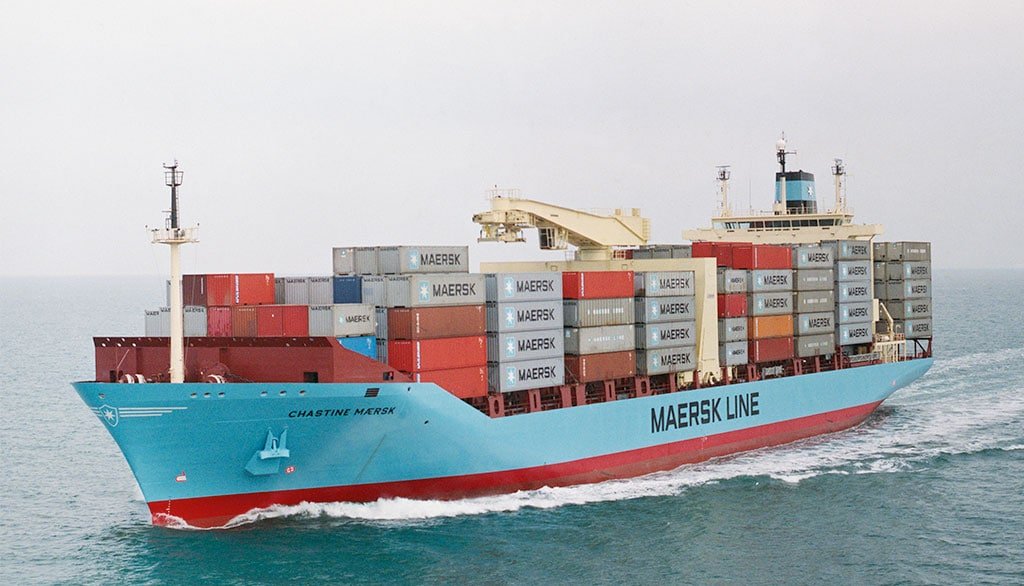
Ten more leading shippers join the initiative for maritime decarbonization: Ten leading companies and large global shippers, including DuPont, Electrolux, Philips, and Target, are joining the Cargo Owners for Zero Emission Vessels (coZEV) initiative doubling the number of shippers participating in the platform dedicated to accelerating the transition to zero-carbon maritime shipping.
CoZev was launched in October 2021 by the non-profit Aspen Institute to provide a platform for multinational companies to come together for high-impact initiatives designed to accelerate the transition to zero-carbon maritime shipping. The participants join the organization’s 2040 Ambition Statement, the first-of-its-kind call to action from cargo owners committing to progressively switch all of their ocean freight to vessels powered by zero-carbon fuels by 2040. It also provides a forum for the companies to explore efforts while coZEV also organized signatories IKEA, Unilever, and Tchibo to call on policymakers in the European Union to discuss the FuelEU Maritime Proposal.
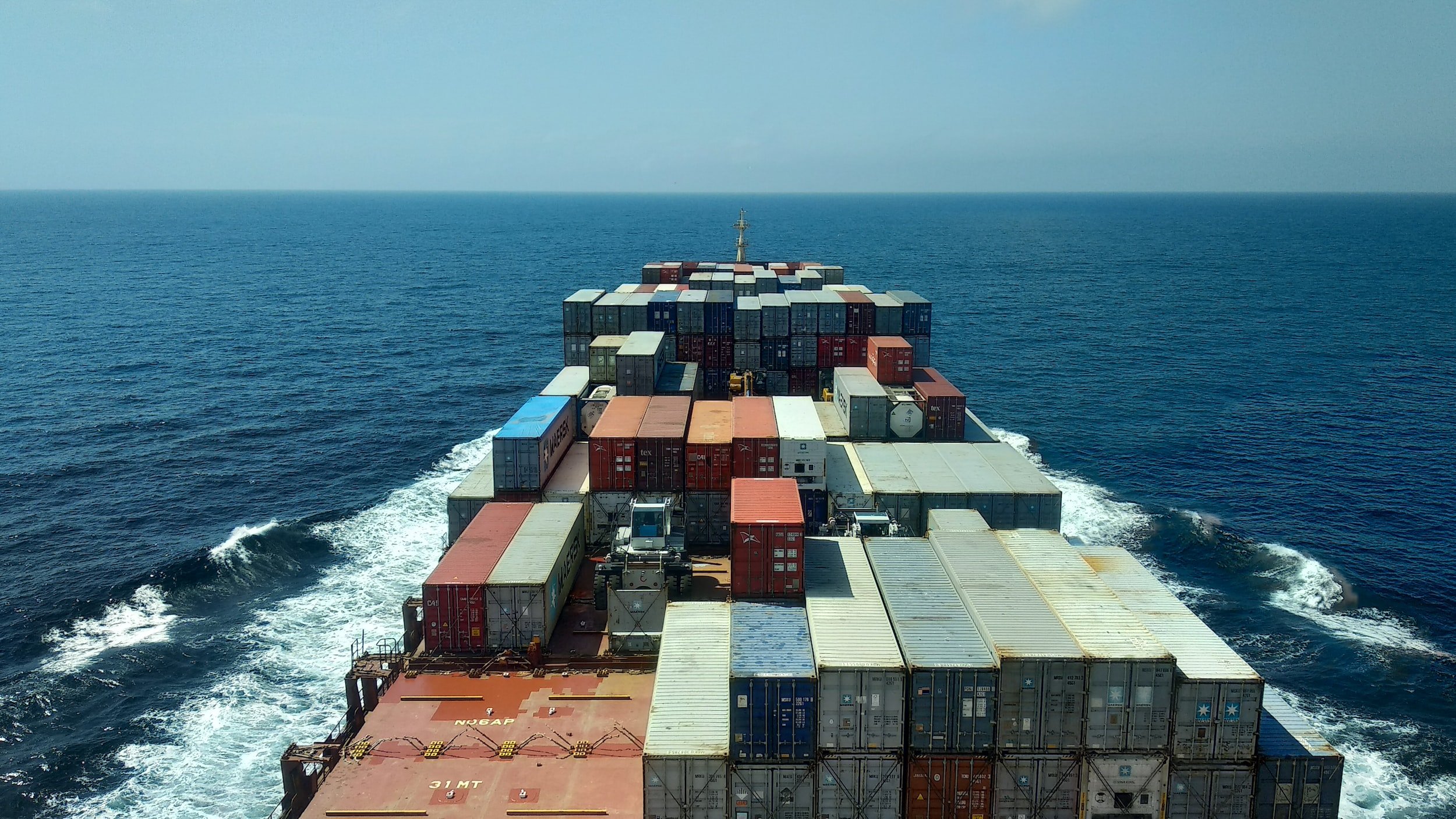 Cosco Shipping Captive joins Poseidon Principles for Insurance:
Cosco Shipping Captive joins Poseidon Principles for Insurance: Cosco Shipping Captive Insurance has become the first Asian marine hull insurer to sign up to the Poseidon Principles on climate. PPMI was launched in December 2021 and is a framework of companies can use to measure their portfolios against climate goals. The framework is built on the same four principles as Global Maritime Forum stablemates the Poseidon Principles for Financial Institutions and the Sea Cargo Charter: Assessment of climate alignment, accountability, enforcement, and transparency.
 Kongsberg Digital to digitize entire GasLog LNG fleet:
Kongsberg Digital to digitize entire GasLog LNG fleet: Norwegian digital solutions provider Kongsberg Digital has signed an agreement on the Vessel Insight infrastructure with Gaslog LNG, a Bermuda-based provider of LNG shipping services. Under the agreement, the entire GasLog LNG fleet, counting 35 vessels, will be digitized, resulting in better data collection and utilization for the company. As explained, connecting to Kongsberg Digital’s Vessel Insight Infrastructure ultimately provides Gaslog LNG with instant and easy access to fleet overview, vessel-specific dashboards, and analysis tools.
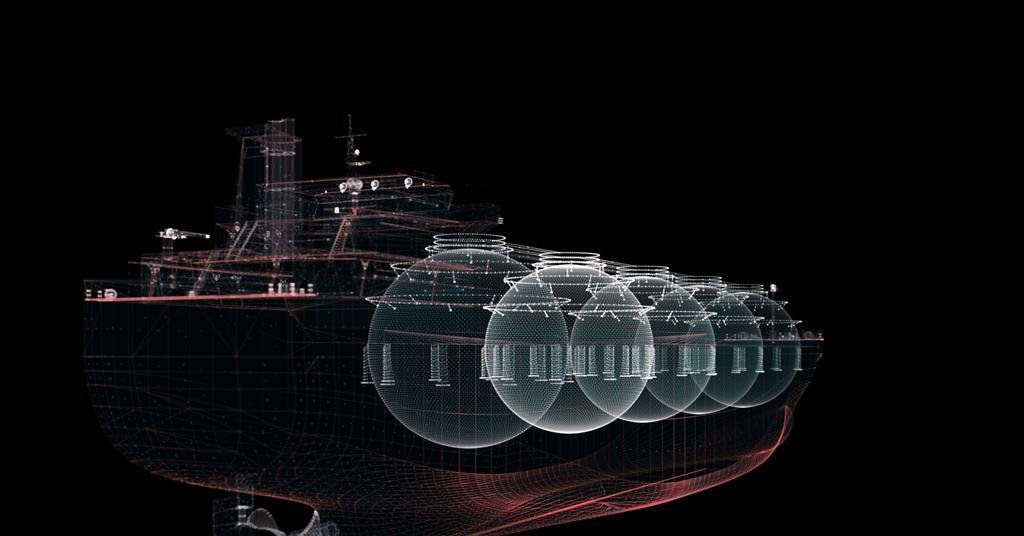
Siemens commissions a green hydrogen plant in Wunsiedel: Now, up to 1,350 tonnes of green hydrogen can be generated annually from renewable solar and wind power in the Wunsiedel Energy Park. Hydrogen is generated by an electrolyzer with a total capacity of 8.75 megawatts. By using the hydrogen generated in Wunsiedel and the related replacement of fossil fuels, annual CO2 emissions can be cut by up to 13,500 tonnes. As a general contractor, Siemens Smart Infrastructure is responsible for constructing the hydrogen plant and creating a monitored and controlled power grid.
Next Generation of Vessels
LCO2 CARRIERS
LR and LISCR award design approval for the world’s first 30,000cbm liquified CO2 carrier: Lloyd’s Register (LR) and Liberian International Ship and Corporate Registry (LISCR) have awarded Design Approval to Hyundai Mipo Dockyard (HMD) for the development of the world’s first 30,000cbm liquefied carbon dioxide carrier. The new carrier will incorporate a new type of steel in its tanks, supporting greater efficiencies in the carbon capture and storage (CCS) value chain.
LR will provide advice and guidance on technical regulations and the development of a Type C storage tank using the new material. When built, the carrier will transport liquefied carbon dioxide under pressure, allowing carbon captured to be transported to storage facilities. Liberian Flag Administration will liaise with LR to formalize the approval and provide the required certification to allow the LCO2 Carrier to enter into service.
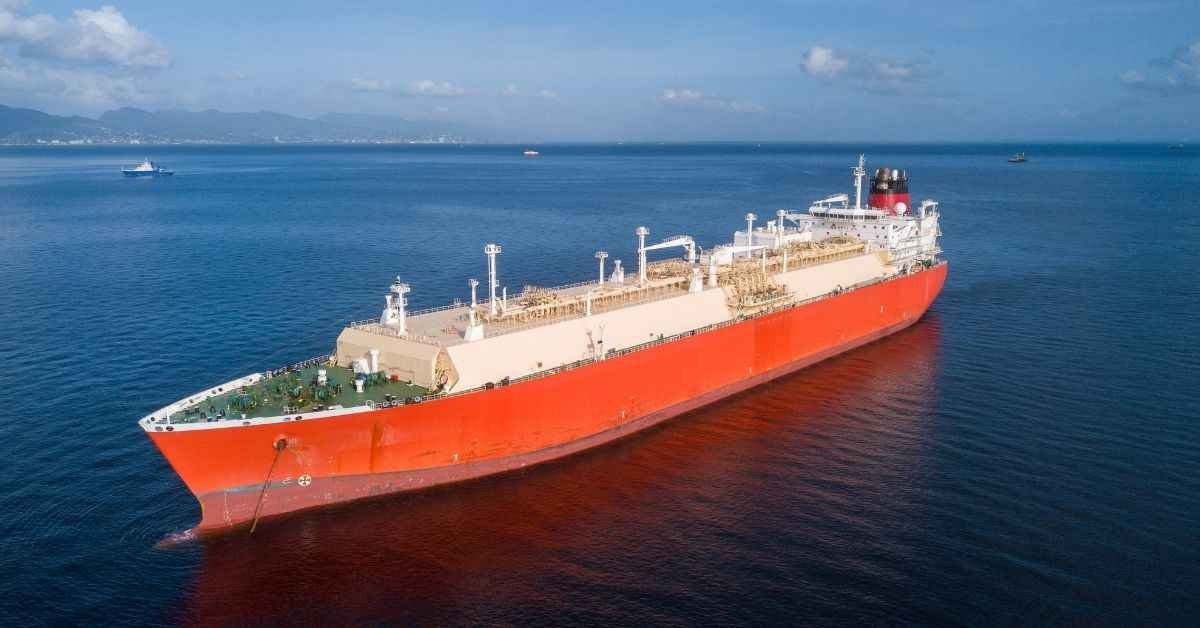 HMD’s 30,000cbm LCO2 carrier design gets the green light:
HMD’s 30,000cbm LCO2 carrier design gets the green light: Hyundai Mipo Dockyard (HMD) has won design approval for the development of the world’s first 30,000cbm liquefied carbon dioxide carrier. The new carrier will incorporate a new type of steel in its tanks, supporting greater efficiencies in the carbon capture and storage (CCS) value chain. The approval was given by two classification societies: Loyd’s Register (LR) and Liberian International Ship and Corporate Registry (LISCR). LR said that it would provide advice and guidance on technical regulations and the development of a Type C storage tank using the new material. When built, the carrier will transport liquefied carbon dioxide under pressure, allowing carbon captured to be transported to storage facilities.
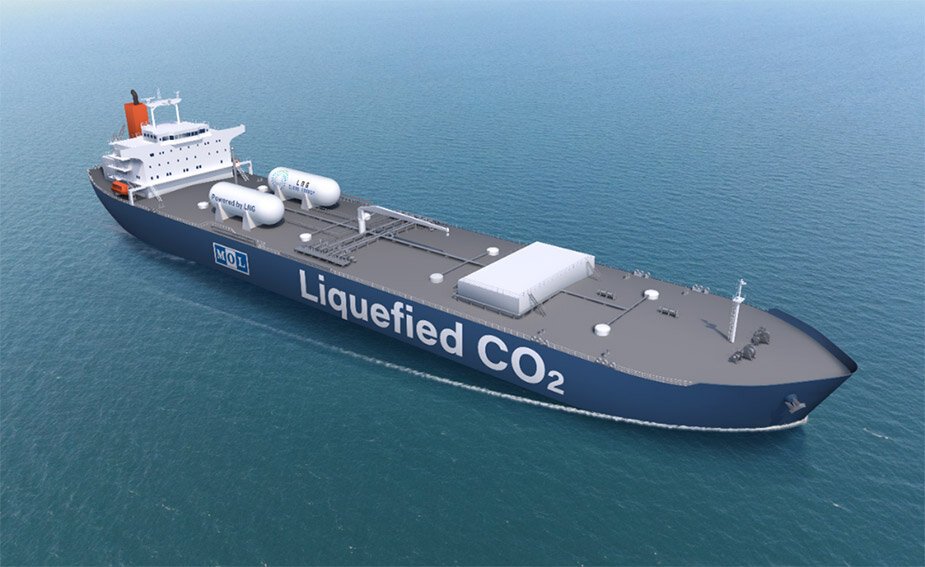
TANKER
GSI delivers Shell-backed LNG-fueled tanker Proteus Philippa: Guangzhou Shipbuilding International, a subsidiary of China State Shipbuilding Corporation, has delivered a 110,000 dwt LNG dual-fuel crude oil/product tanker to the Bank of Communications Financial Leasing (BoComm FL) from China. The vessel, named MT Proteus Philippa, is the third LNG-powered tanker from the series of eight being built by the yard, with its two sister vessels named and delivered in May and August this year respectively. The two LR2 tankers are named Proteus Harvonne and Proteus Sinead. Bank of Communications and Financial Leasing has also recently taken delivery of another LNG-fueled LR2 tanker, Proteus Jessica, which was built by China’s Shanghai Waigaoqiao Shipbuilding.
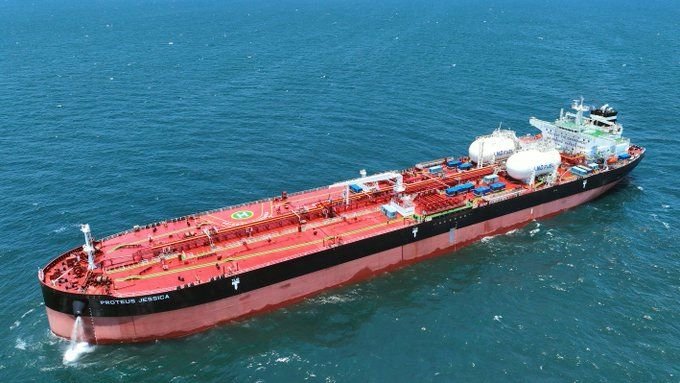
LNG
New LNG carrier design eliminates methane slip: Siemens Energy, Moss Maritime, DNV, and Fearnleys have developed an LNG vessel design that will be powered by a hybrid combined-cycle power and propulsion plant. Under the concept, many engine components, including the main engines can be removed from the ship. The backbone of the vessel’s hybrid combined-cycle, power and propulsion plant is an SGT 400 gas turbine in combination with the heat recovery steam generator, steam turbine, and the BlueVault energy storage solution for the electrical propulsion and distribution system. As disclosed, the plant burns fuel in an efficient manner producing low levels of nitrogen oxide and practically no methane slip. Due to the reduced number of components, less time and effort would be needed for the construction process, and there is more space for cargo.
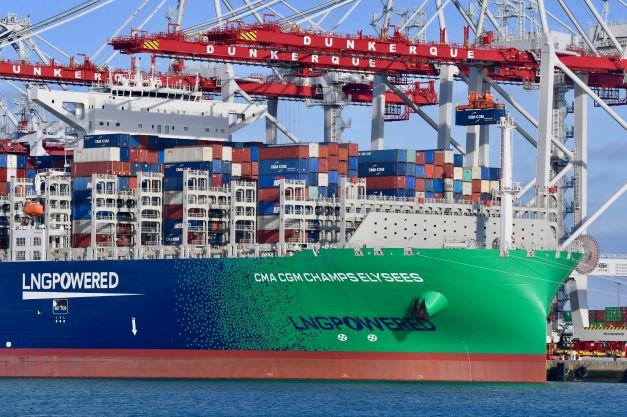
CONTAINER
CMA CGM orders seven new biogas-powered vessels to serve French West Indies: The French Ocean carrier has confirmed the order of seven new container vessels, powered by biogas, aiming to upgrade its services to the French West Indies. Four of the new box ships will have 7,300 TEU capacity and the other three vessels will have 7,900 TEU capacity, while all the ships will have 1,385 reefer plugs. The newbuildings will be delivered gradually as of 2024 and are expected to serve Guadeloupe and Martinique, replacing smaller ships dedicated to routes between the French West Indies, France, and Europe. In order to cope with these larger capacity vessels, the CMA CGM Group said it will help to modernize and increase the capacity of the biggest shipping ports in Guadeloupe and Martinique, as well as making wharfs larger.
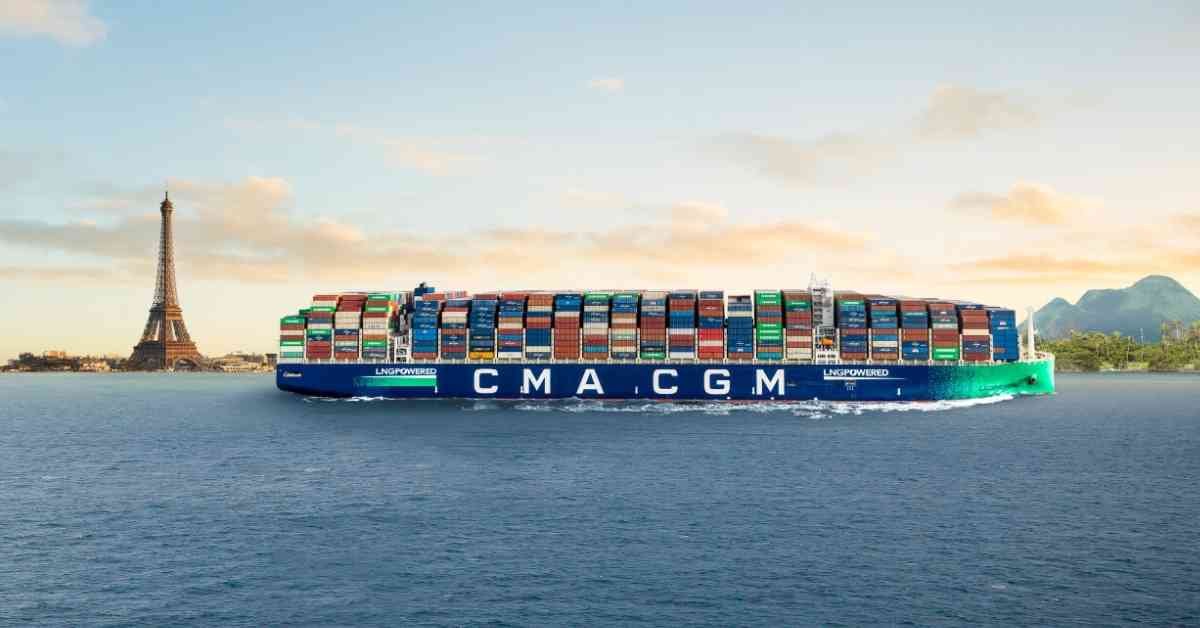
OTHER
Meriaura, partners to build a green ammonia-powered cargo ship: Finnish shipping company Meriaura, engine maker Wärtsilä, and Green NortH2 Energy have signed a Letter of Intent for building a cargo vessel that runs on green ammonia. The vessel will be ordered and operated by Meriaura, and Green NortH2 Energy is responsible for supplying green ammonia fuel, which is produced with renewable electricity. The vessel will be fitted with Wärtsilä’s modular multifuel main engines. The delivery of the vessel is targeted for 2024 and it is planned to start operating on green ammonia in 2026. The vessel is designed to trade in heavy project cargo segment together with Meriaura’s existing open deck carriers. Besides ammonia, it can be powered by bio-oil or marine diesel oil (MDO).
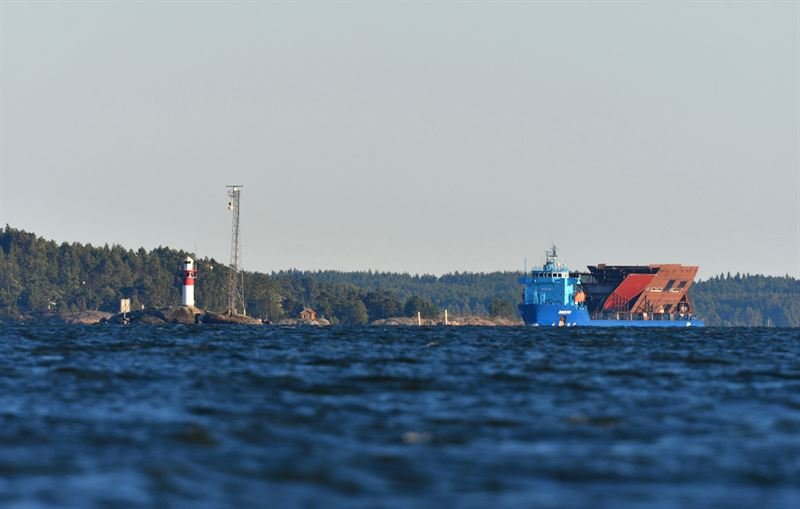 Dalian delivers China’s 1st seagoing LNG bunker vessel:
Dalian delivers China’s 1st seagoing LNG bunker vessel: LNG bunker vessel XIN AO PU TUO HAO, built by Dalian Shipbuilding Industry, was delivered to Dalian Shipbuilding Industry Offshore Base on Friday, 16 September. The 8,500 cbm LNG bunkering vessel was contracted by ENN Energy Holding, one of the largest LNG users in China, back in 2018 and it will be operated by Tianjin Southwest Maritime Limited. It is the first domestic newbuilding LNG bunker vessel that is classed by the China Classification Society (CCS) in line with the Rules for Liquefied Natural Gas Bunkering Vessel. The vessel, described as China’s first seagoing LNG bunker vessel, was scheduled for delivery in 2020, however, its construction got delayed.
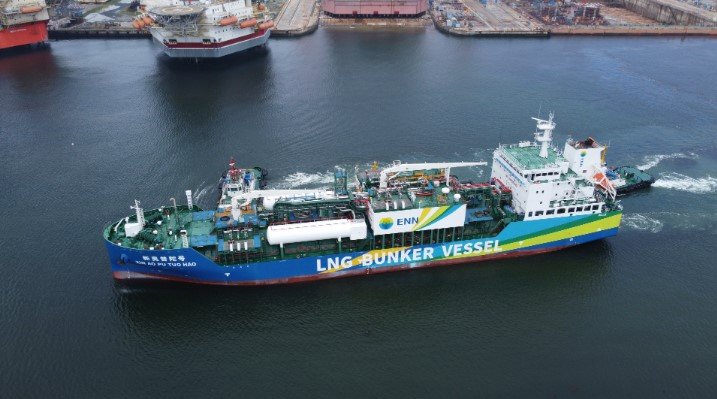
Technology
MAN clears the path for methanol uptake with new engine approval: German engine manufacturer MAN Energy Solutions (MAN ES) is pushing forward with the development of methanol-ready engines for the maritime industry to meet the growing demand for methanol as one of the marine fuels of the future.
The company has secured a type approval certificate for its four-stroke 32/44CR medium speed marine engine from DNV. The engine uses electronic injection, high-efficiency turbochargers, electronic hardware, and variable valve timing resulting in low emissions and high efficiency, and high specific power output, according to its developer. MAN said earlier that it plans to make solutions for the use of methanol in four-stroke engines available from 2024. Four-stroke engines are mostly fitted on container ships, ferries, fishing or cruise vessels, as well as offshore solutions.
Fuels
Amogy ammonia-to-power system approved by LR: Amogy, the US-based ammonia power solutions company, has received approval in principle (AiP) from the classification society Lloyd’s Register. As explained, this represents a significant milestone in certifying Amogy’s ammonia-to-power system for maritime applications, which will be demonstrated for the first time in a maritime vessel in 2023. The AiP covers an ammonia power system that generates electricity from liquid ammonia to power maritime vessels. This is achieved by cracking the liquid ammonia to intodrogen and using the produced hydrogen to generate electrical power through proton-exchange membrane (PEM) fuel cells. Following this achievement, Amogy said it will continue the technology qualification and type approval processes, which would make the ammonia-to-power system fit for use on maritime vessels.
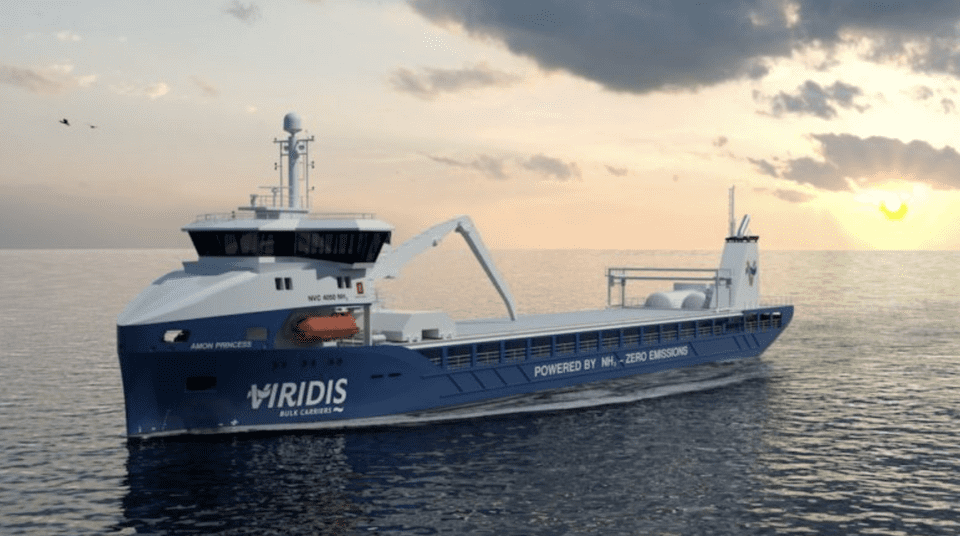
Finland’s Meriaura plans green ammonia demonstration ship for 2024: Finnish shipping company Meriaura, which specializes in project cargo in the Baltic and the North Sea, announced plans to build an ammonia-ready vessel that will be delivered in 2024 and transition to green ammonia in 2026.
The project, which is a continuation of the ship development cooperation launched earlier this year to develop a carbon-neutral vessel for Finland’s Lake Saimaa, will involve cooperation with Wartsila and Green NortH2 Energy. The vessel will be equipped with Wärtsilä’s modular multifuel main engines, giving it the ability to operate on marine diesel or bio-oil as well as ammonia.
Green NortH2 Energy will supply the green ammonia fuel for the ship. The fuel will be produced with renewable electricity.
Biofuels
Holland America Line completes cruise industry’s 1st long-term biofuel test: The US-based cruise line Holland America Line, part of Carnival Corporation, has completed the cruise industry’s first multiweek test of biofuels onboard Volendam at the Port of Rotterdam in the Netherlands. The 20-day test was conducted in partnership with Dutch marine biofuels supplier GoodFuels and Finnish technology company Wärtsilä.
The assessment was completed on 7 September. In the first five days of the test, the ship used a mix of 30% biofuel and 70% marine gas oil (MGO) in one of its main auxiliary engines. For the final 15 days of testing, the ship used 100% biofuel. According to GoodFuels, there was a 78% decrease in lifecycle CO2 emissions during the final 15 days of the trial compared to marine gas oil emissions.
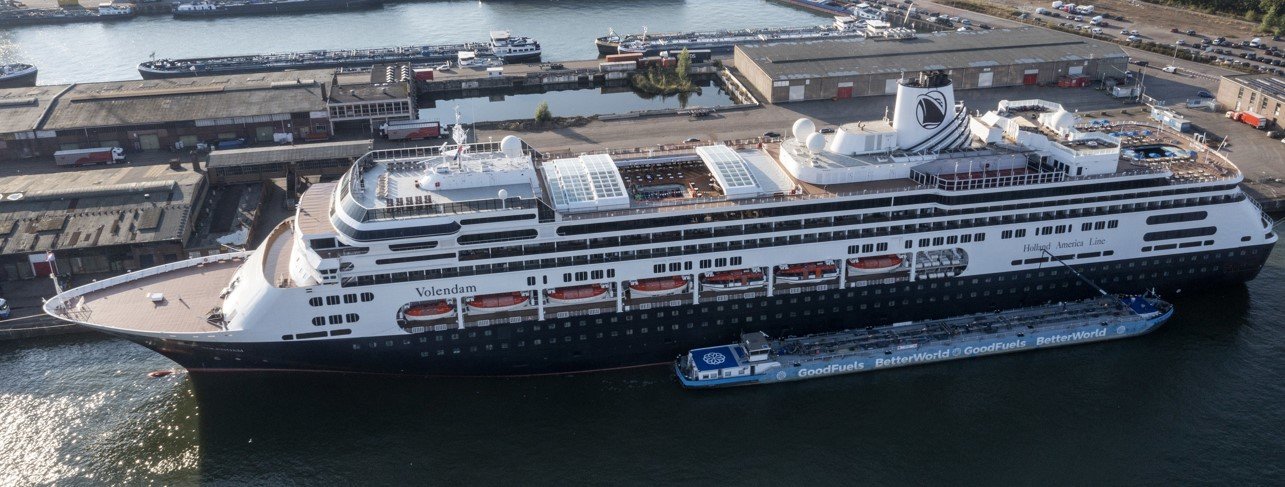
CMA CGM tests the waters with biofuel: TotalEnergies Marine Fuels has completed the refuelling of a CMA CGM containership in Singapore with sustainable marine biofuel, a major milestone for the company as it seeks to become a key biofuel bunker supplier across strategic bunker hubs by 2030. On 29 July 2022, the 4,294 TEU CMA CGM Montoir container vessel was bunkered via ship-to-ship transfer with TotalEnergies-supplied biofuel. The biofuel is made of very low sulfur fuel oil (VLSFO) blended with 24% second-generation, waste-based and ISCC-certified used cooking oil methyl ester (UCOME). The operation follows biofuel bunkering trials that TotalEnergies Marine Fuels performed in Singapore with a COSCO Shipping Lines containership, a vehicle carrier operated by Mitsui O.S.K. Lines, Ltd. (MOL) and a bulk carrier chartered by NYK Line this year.
Shipyards
Leviathan, German Naval Yards aim to be the powerhouse of EU green ship recycling: Germany-based green ship recycling center Leviathan will collaborate with local shipyard German Naval Yards on facilitating green and sustainable ship recycling. The cooperation was announced during the presentation at Ship Recycling Lab being held in Rotterdam from 20 to 21 September. The companies have signed a letter of intent to join their forces to be “the powerhouse of European green ship recycling“.The technology developed by Leviathan can now be offered to shipowners in a dock of 426x88m, supported by the infrastructure and workforce of German Naval Yards. The duo expects this cooperation to be game-changing within the ship recycling market, making the first sustainable and almost emission-free ship recycling worldwide possible by using cold water cutting technology.
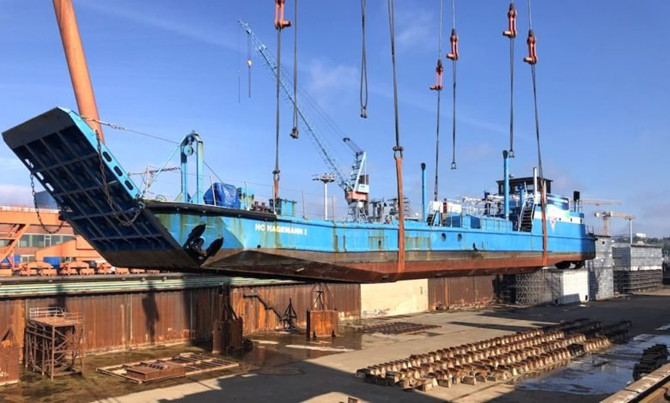
Ports
HHLA CTA aims to become an import hub for hydrogen: The first test delivery of hydrogen and its derivatives import has been completed at the climate-neutral HHLA Container Terminal Altenwerder in the port of Hamburg. The pilot delivery sets an important milestone for the medium-term imports of green hydrogen, according to Hamburger Hafen und Logistik AG (HHLA). HHLA signed an agreement with Abu Dhabi National Oil Company (ADNOC) in March 2022 to test the transport chain for hydrogen from the UAE to Germany. The hydrogen supplied by Abu Dhabi National Oil Company (ADNOC) was shipped in the form of the hydrogen derivative ammonia, while the ammonia supplied will be used by the multi-metal manufacturer Aurubis for test runs for the climate-neutral conversion of gas-intensive copper wire production, thus replacing fossil fuel in the long term.
 Germany to transform Rostock, and Lubmin into energy ports of the future:
Germany to transform Rostock, and Lubmin into energy ports of the future: Germany’s government revealed plans to upgrade ports of Rostock and Lubmin in Mecklenburg–Western Pomerania state into energy ports, supporting the country’s energy security strategy. In Brandenburg, the federal government presented a future package for the transformation of east German refinery sites and ports on 16 September. The package contains in particular measures for the development of the energy ports in Mecklenburg-Western Pomerania as well as the maintenance of the refinery of the PCK Schwedt and the refinery Leuna in Saxony-Anhalt.
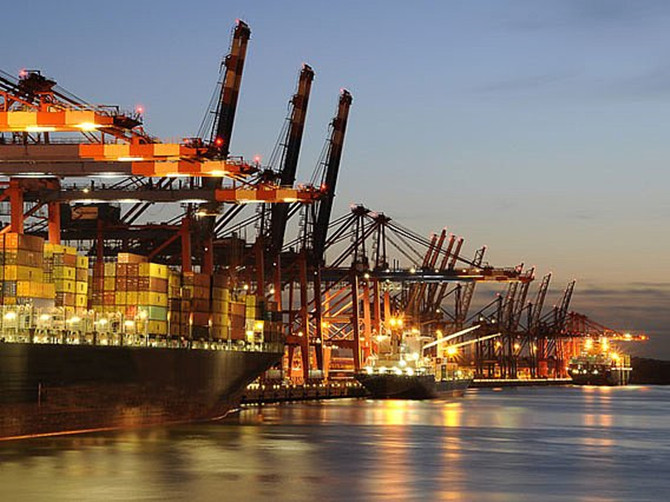
Shipping Finance
DBJ, ClassNK establish a green ship finance program: Development Bank of Japan (DBJ) and classification society ClassNK have established “Zero-Emission Accelerating Ship Finance (program)” to support the maritime industry’s transition toward decarbonization. As tightened environmental regulations and the future introduction of carbon pricing are expected in the maritime industry, DBJ and ClassNK have anticipated an increasing need for a system to reasonably evaluate the asset value of environmentally friendly ships and to combine them with investment and financing. Under the established program, ClassNK evaluates ships based on a comprehensive scoring model jointly developed by DBJ from the perspective of “decarbonization, environmentally friendly performance, and innovativeness,” and DBJ provides investment and financing.
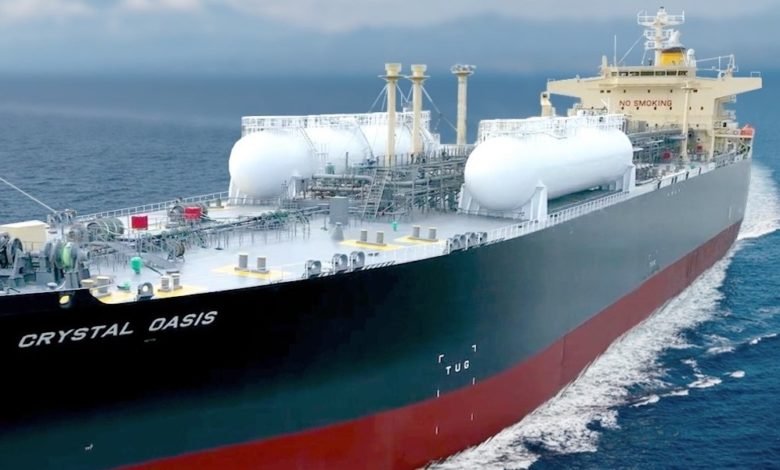
Banks raise decarbonization benchmark standard in Poseidon Principles: The leading banks that finance the shipping industry along with the marine insurers participating in the Poseidon Principals initiative have agreed to increase the standards by which they measure climate alignment in the maritime industry. They are committing to aligning the Poseidon Principles with the ambition of the UN and the latest available climate science comes as the organization also reported the thirtieth financial institution signatory to the commitment meaning it now includes more than 65 percent of the global ship finance portfolio. Under the new commitment, the 30 shipping banks and 16 marine insurance providers and brokers participating in the Poseidon Principles will add additional trajectories to report climate alignment aligned with net-zero by 2050 and a maximum temperature rise of 1.5C above pre-industrial levels by 2100, to meet the temperature goals of the Paris Agreement.
Green Corridors
Green energy corridor to connect Queensland and Korea: Three of Korea’s large conglomerate groups have formed a new consortium to use hydrogen potential and build a green energy export corridor between North Queensland and northeast Asia. The consortium consists of Australian-based Ark Energy and its parent company Korea Zinc, as well as Korean conglomerates Hanwha Impact and SK Gas. The memorandum of understanding (MoU) was signed to officially launch the Han-Ho Hydrogen Consortium which would develop a supply chain to export more than one million tons of green ammonia per annum from Australia to Korea by 2032. The main part of the consortium’s plans will be the development of Ark Energy’s Collinsville Green Energy Hub southwest of Bowen which will have the potential to generate up to 3,000 megawatts.
Regulations
EU needs to include smaller vessels in its ETS: A broad coalition of 35 maritime companies supported by Transport and Environment NGO are urging the European co-legislators to add ships under 5,000 GT including offshore and service vessels into EU regulations targeting decarbonization of the shipping industry. A joint letter addressing the EU Parliament, Commission, and Council of the EU said that the gross tonnage threshold for Monitoring, Reporting and Verification (MRV) Regulation, the Emissions Trading System (ETS) Directive, and the FuelEU Maritime Regulation should be brought down to 400 gross tonnage. The group also said that offshore and service vessels should be included in these regulations as well. The calls are being issued on the back of a proposal to include shipping in Europe’s emissions trading system, which includes several exemptions and phase-in approaches.
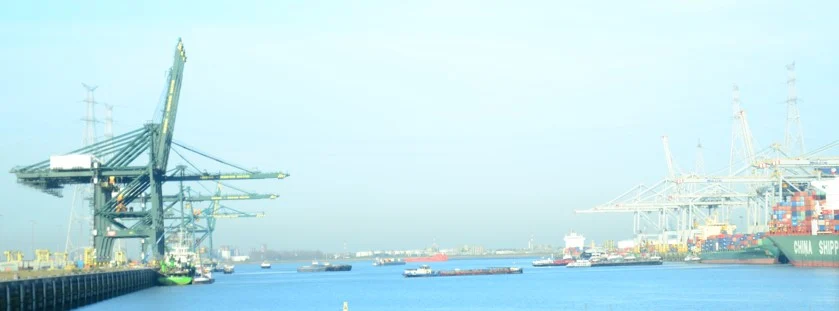
By Maria Bertzeletou, Breakwave Advisors
The opinions expressed herein are the author's and not necessarily those of The Xinde Marine News.
Please Contact Us at:
media@xindemarine.com



















 Ningbo Containerized Freight Index Weekly Commentar
Ningbo Containerized Freight Index Weekly Commentar  Ningbo Containerized Freight Index Weekly Commentar
Ningbo Containerized Freight Index Weekly Commentar  Ningbo Containerized Freight Index Weekly Commentar
Ningbo Containerized Freight Index Weekly Commentar  BIMCO Shipping Number of the Week: Bulker newbuildi
BIMCO Shipping Number of the Week: Bulker newbuildi  Ningbo Containerized Freight Index Weekly Commentar
Ningbo Containerized Freight Index Weekly Commentar  Ningbo Containerized Freight Index Weekly Commentar
Ningbo Containerized Freight Index Weekly Commentar